Secrets of facade decor: a variety of shapes and materials
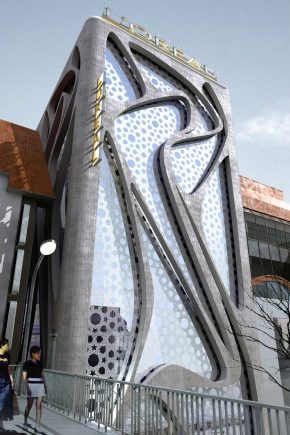
Looking at any house, one can immediately notice the features of the facade decor, its unique elements, unusual style, and aesthetics of architecture. A private house can be interesting and original, even turn into a small palace, castle or fortress in the Gothic style, if you turn on your imagination and have some knowledge.
Facade decor is the hallmark of the house. If the outside of the building looks attractive and aesthetically pleasing, it is immediately clear that inside it has the same elegant and stylish interior. The facade indicates the status of the owner, and also gives the building individuality and originality.
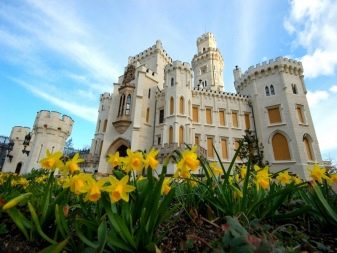
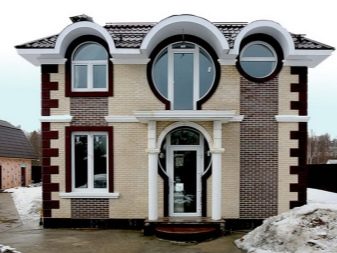
Peculiarities
Anyone knows that a well-kept and beautiful house is always a pleasure to look at. Personalization allows you to create your own face at home. There are many options that can help make a building not only attractive, but also unique.
The main positive quality of the facade decor is the ability to distinguish a building from many others. Facade decor can replace architectural delights and make the design of a house, which is built according to a standard project, individual.
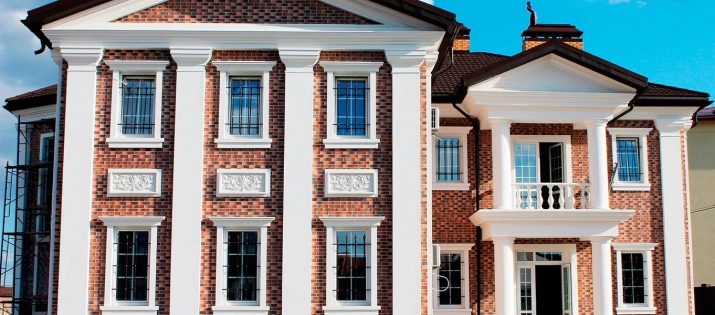
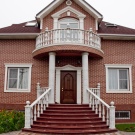
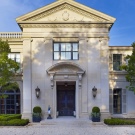
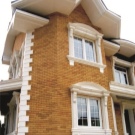
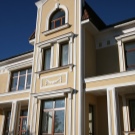
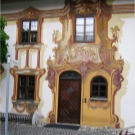
Main elements
In order to make a building look stylish, luxurious and impressive, you need to think about what decorative elements will be used in decorating the facade. There are a large number of different product options for decorating the facade. They are capable of incredibly transforming a building and decorating it in a specific style.
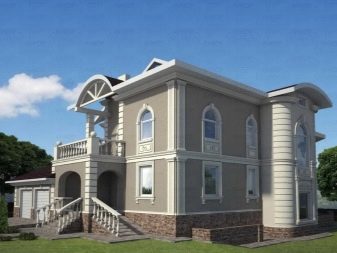
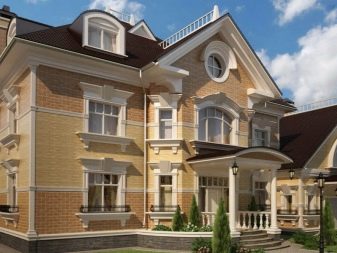
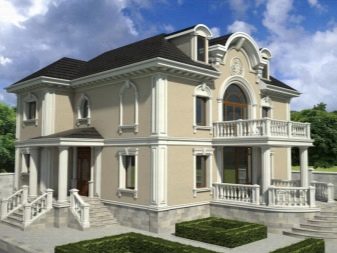
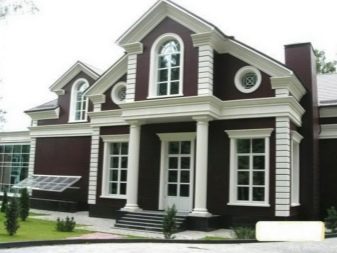
Rust
They are the most ancient element of facade decoration. When decorating any building, rustic details should be used, which are stone panels that have the visual effect of stone masonry. Most often they are used as a decoration for a basement, ground floors, facade corners or square columns.
If you combine panels of various sizes, as well as correctly place and combine them, you can create a beautiful framing of the walls, which, when combined with other design elements, allows you to create a unique facade decor.
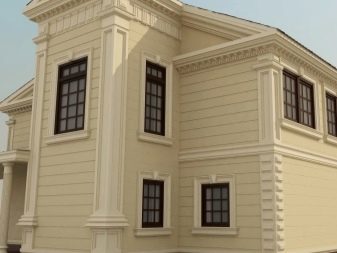
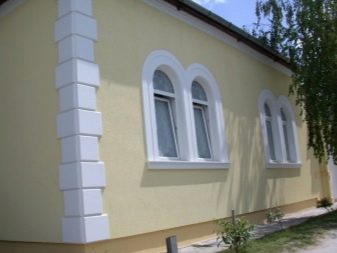
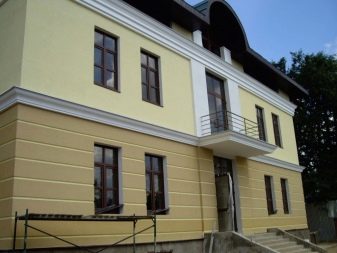
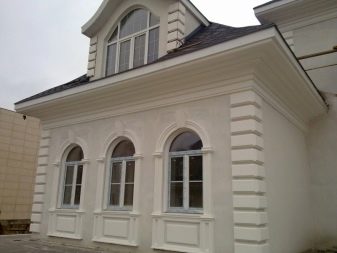
Facade window sills
Window sills can create a rather unusual and interesting facade design. With the help of these elements, it is possible to emphasize the supporting part of the window opening if you use massive or miniature window sills with moldings, moldings, key stones or other decorative elements.
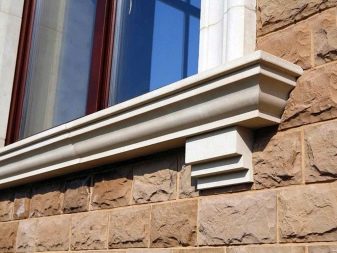
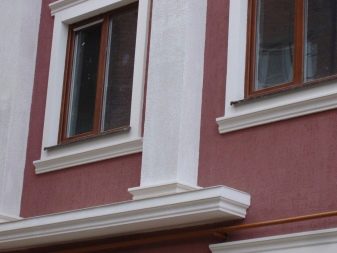
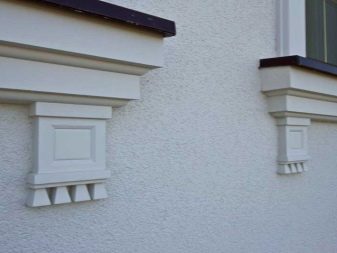
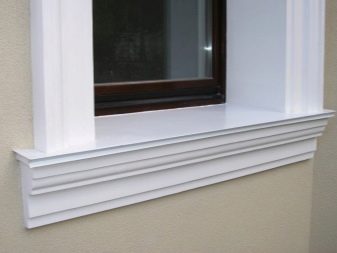
Facade window decoration
Nowadays, finishing of external slopes on windows is quite popular, which performs not only the function of protection, but also allows you to decorate the facade. There are many colors of finishes, forms of decorative materials and their sizes. Using this element, you can create an original facade in one of the well-known styles.
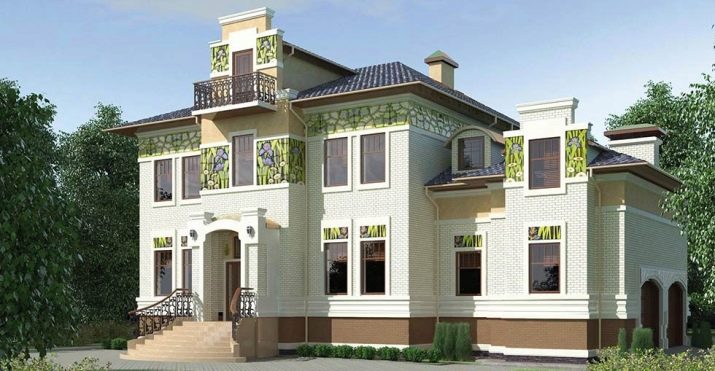
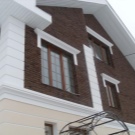
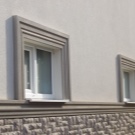
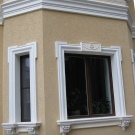
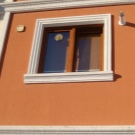
Facade columns
The most beautiful and noticeable part of the facade decor is the columns. They are able to give the building a chic classic look, as well as narrow or expand the walls visually. When purchasing a column, you need to choose the right style for its implementation so that this decorative element does not stand out from the overall design of the house.
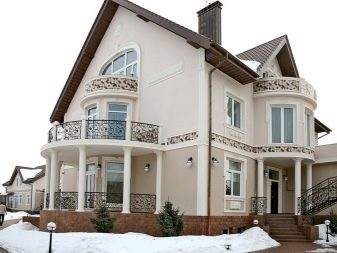
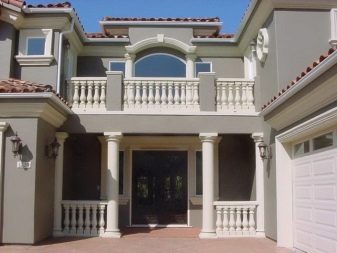
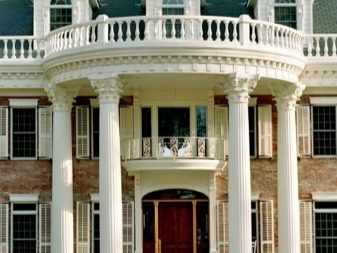
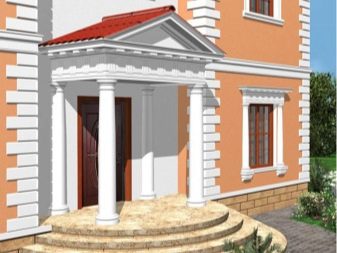
Balustrades
This element is usually a staircase decoration. If you choose it correctly, you can make the building more neat, pompous and luxurious.It is necessary to purchase balustrades according to the architectural style of the facade, as they are capable of attracting a lot of attention to themselves, and the disharmony of styles will be quite noticeable. Most often, these elements are made of stone, plaster, concrete mixes, wood and other materials.
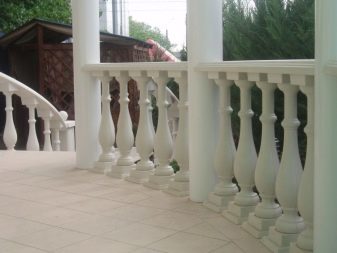
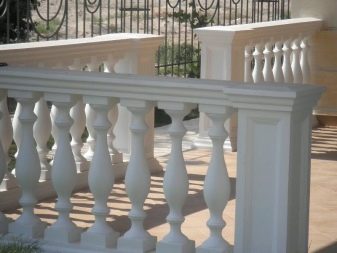
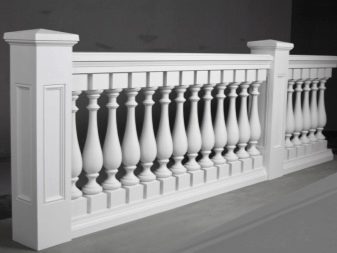
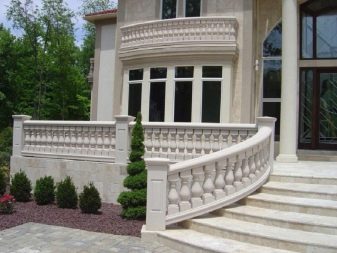
Materials (edit)
Stucco cladding is a great way to decorate your home and make it more interesting and unique. Before you start decorating a facade, you need to consider the properties of various materials.
The most popular material in the production of facade decorative elements is gypsum. Aesthetic, detailed and individual elements are made from it. But there is also a drawback to this material - gypsum absorbs moisture well, so it is unlikely to look attractive after a few years. It must be restored at regular intervals.
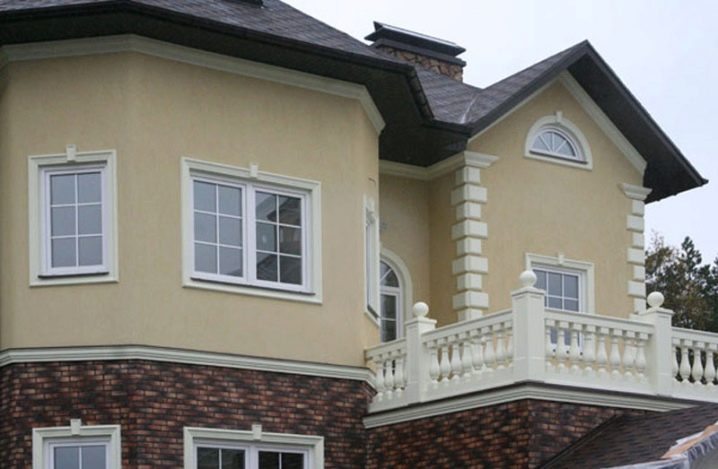
It must be remembered that gypsum is one of the heaviest materials, so you should purchase reliable and durable fasteners in order to avoid a variety of problems.
Similar nuances can occur with other materials, such as artificial stone and concrete.
Concrete has a gray tint, so it loses a little compared to gypsum. If the material is dyed, it will need to be repainted every few years.
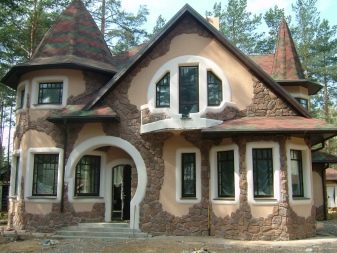
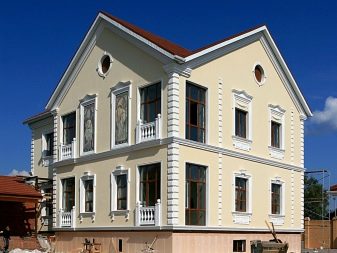
The artificial stone looks like sandstone and has yellow tones. The attractive texture can attract many, but this material is poor for the manufacture of delicate parts.
One of the disadvantages of concrete, plaster and artificial stone is that they are difficult to install. When decorating the facade, it is necessary to take into account the weight of the decor, since the facade is not always able to withstand any load. If the owner nevertheless chose a heavy decor, the foundation and walls should be strengthened.
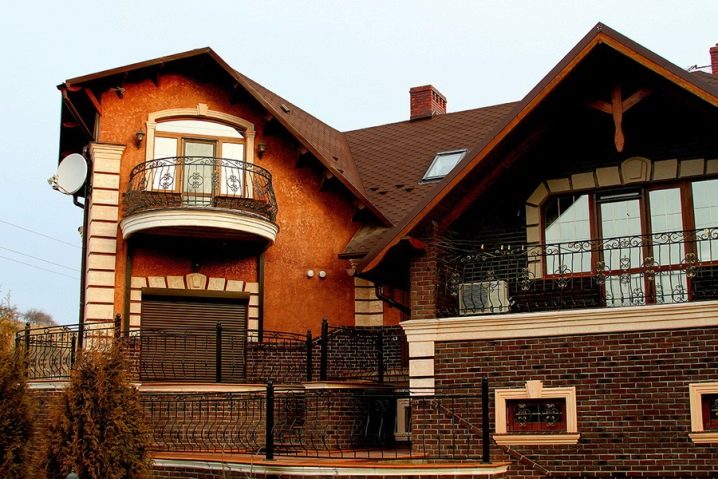
Polymeric lightweight materials such as polyurethane, fiberglass, polystyrene and polymer concrete are the best option for facade decoration. The lowest price is polystyrene. Various decorative elements are cut out of it, without complex detailing and bas-reliefs. This material perfectly absorbs moisture, so you need to use it where water will not get on its surface in the future. Then it is painted and reinforced with mesh.
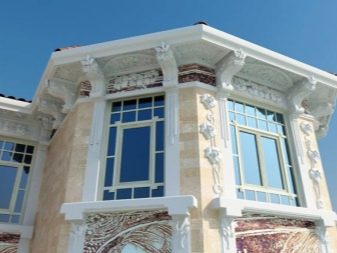
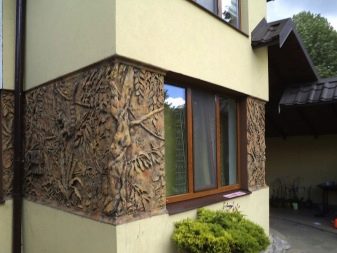
Each fiberglass product is handcrafted.
This allows you to use the customer's sketches and get various elements for custom-made decor. That is why many people believe that fiberglass is a rather profitable and convenient production product. The products have a strong shell that allows the element to be fixed in a specific way.
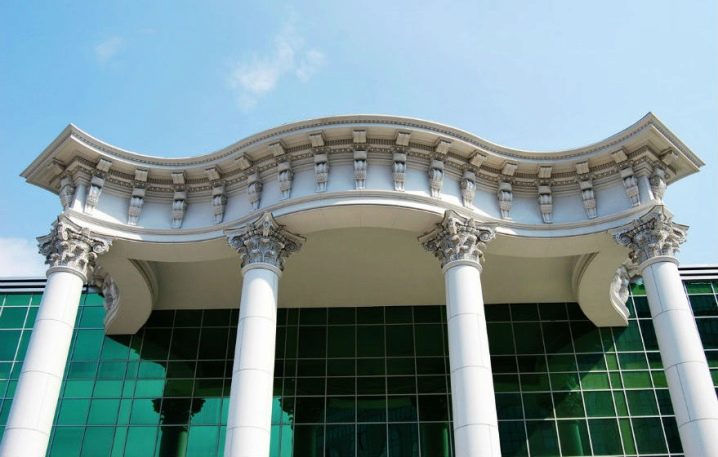
Polyurethane is an excellent material, products from which include many positive qualities:
- high degree of detailing of products;
- light weight;
- not exposed to moisture;
- the material is easy to modify or cut during installation;
- easy installation, affordable both in price and in volume.
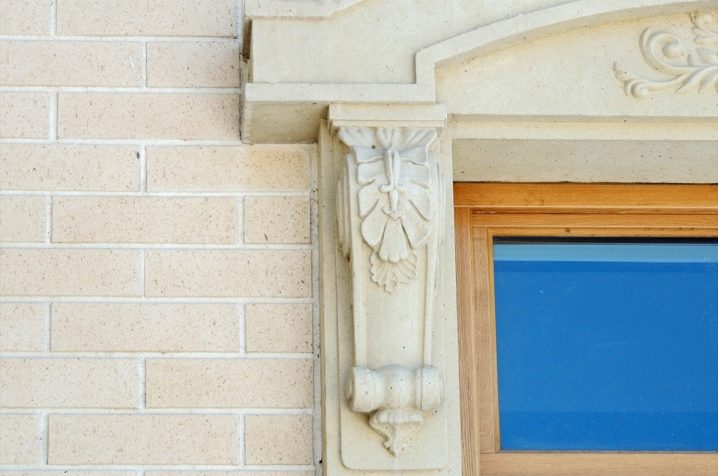
Fiberglass concrete is a unique composite material that includes a plasticized mixture of concrete with fiberglass, which has a reinforcing function.
Fiberglass concrete properties:
- light;
- does not give a large load on the supporting structures;
- high strength of the material allows the use of bends and stretching;
- frost-resistant;
- fire resistant;
- shockproof;
- wear-resistant.
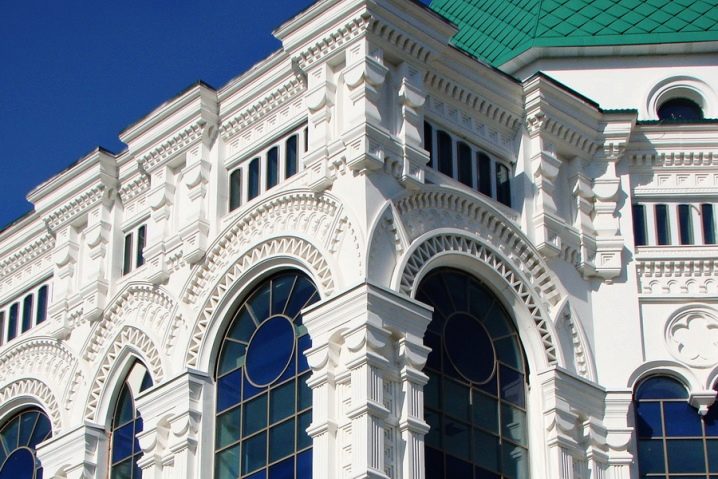
Expanded polystyrene is a material with low thermal conductivity, extremely durable, resistant to various chemicals and good resistance to moisture.
Positive qualities of expanded polystyrene:
- high strength;
- soundproofing;
- a light weight;
- ease of installation;
- affordable price;
- no electrical conductivity;
- non-flammable.
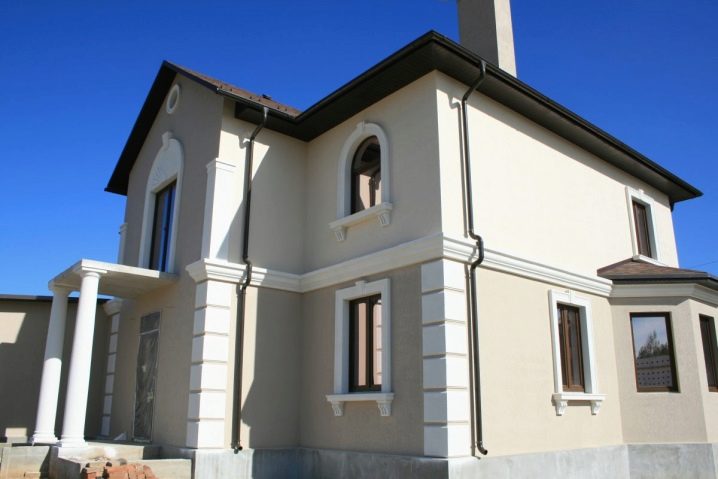
Facade decor made of polyurethane foam has many advantages.
- It is very similar to gypsum, resistant to external influences of any kind, it is quite easy to paint, prime and plaster.
- Does not absorb moisture and is resistant to direct sunlight.
- The material is lightweight and affordable.
- There are many models, you can also order an element of the facade decor from this material individually.
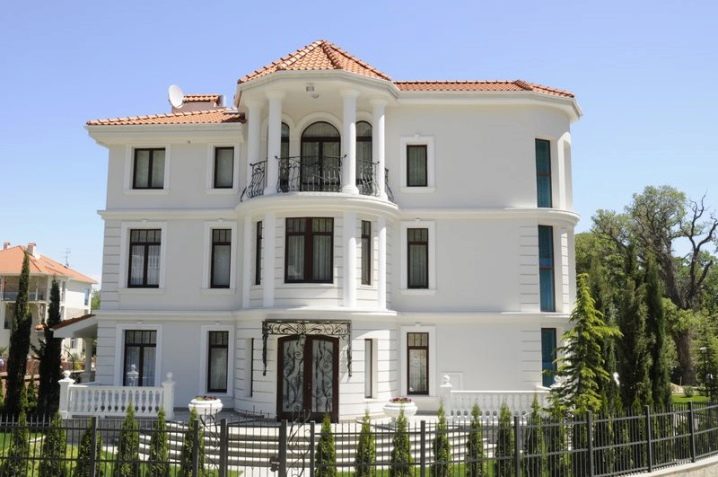
A rather popular option is facing brick. Currently, you can find a large number of shapes and shades, so everyone can choose exactly what will help to realize even the most unusual and creative idea of the designer.
When decorating door and window openings, brick of a regular shape is most often used. But you can also use unusual types of material (for example, trapezoidal bricks). This material is ideal for decorating an arch. Brick of other shapes is able to decorate the space of the arch with platbands or semi-columns. Very often, bricks of non-standard shapes are used to decorate the basements of buildings.
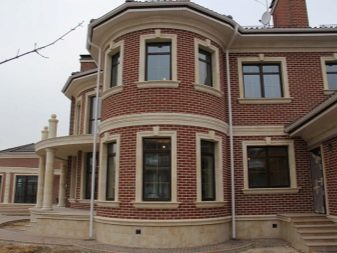
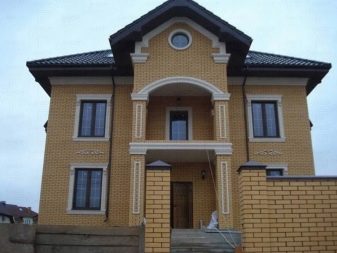
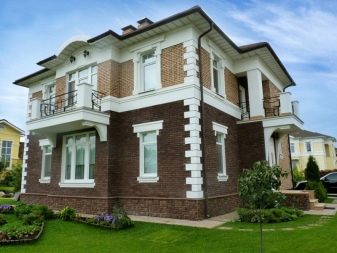
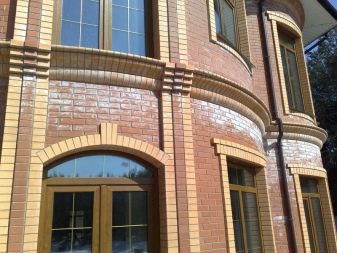
Fiber-reinforced concrete is a mixture of filler and fine-grained concrete. The filler can be glass, synthetic or steel fibers of various diameters and lengths.
Positive properties of fiber-reinforced concrete:
- the material is plastic;
- has high strength;
- durable;
- frost-resistant;
- resistant to negative biochemical and atmospheric influences.
- able to reduce the weight of the architectural structure.
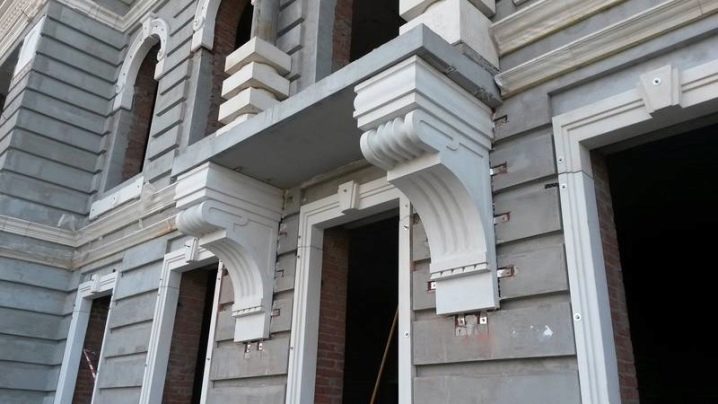
Facade finishing
Most often, the beauty and uniqueness of the facade finish attracts the eye. Buildings designed in this way are remembered for a long time and leave their mark in the memory of any person. Decorative elements make the building unique and interesting.
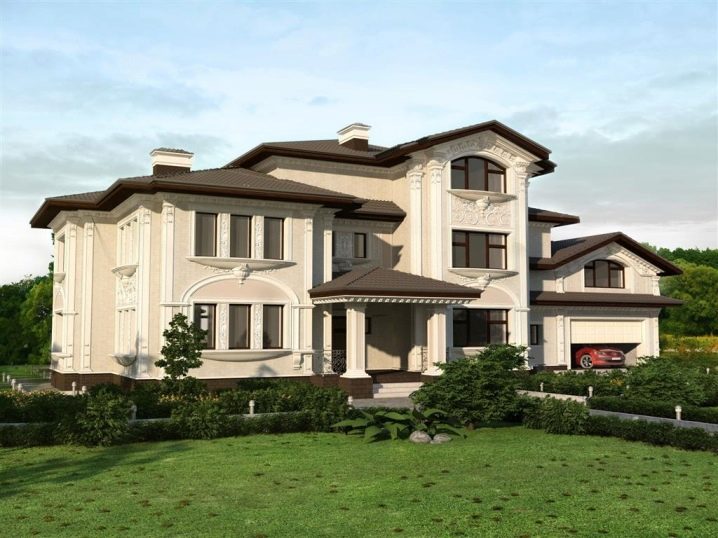
You can apply classic-style decoration, make the building an old castle, decorate with beautiful baroque stucco, or give the house a more modern look.
There are many ways of facade decoration.
- Panels-polyalpanes, sandwich panels. This option is not only decoration for the building, but also facade insulation.
- Alukobond - finishing applied if the facade is ventilated.
- Artificial and natural stone allows the building to become an unusual castle, and is also durable and helps to insulate the facade.
- Siding Is an extremely popular and inexpensive option. There are many colors and shades, so with the help of this option, you can bring to life even the most daring design decisions.
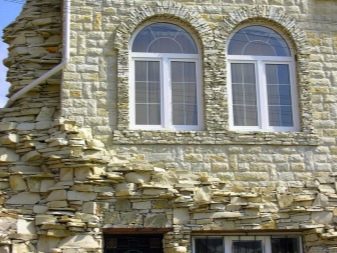
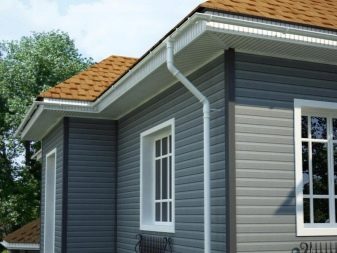
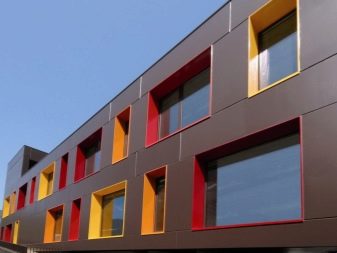
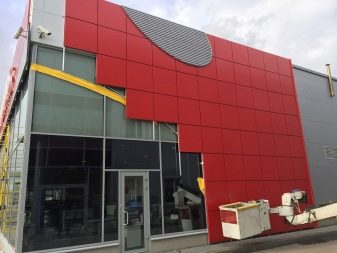
- Tile (porcelain stoneware) creates a durable and easy-to-use facade.
- Plaster - decorative plaster of various textures, plastering for painting.
- Brick renews the facade and makes it warmer.
- There is many different elements of stucco molding: volumetric modeling, pilasters, bas-reliefs and more.
- Facade mosaic decoration gives the building a memorable and unusual look, and also allows you to enjoy its uniqueness.
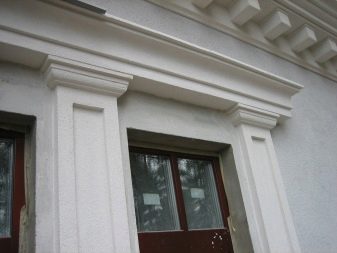
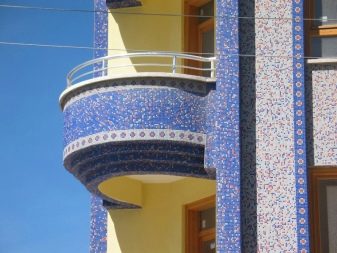
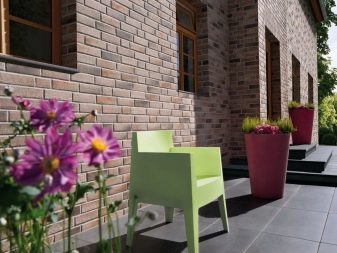
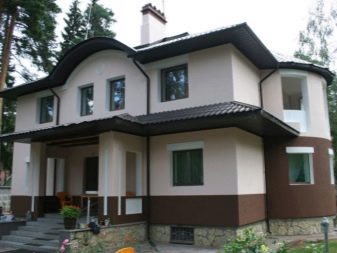
Facade stucco molding is an extremely important feature of a large number of styles: classicism, rococo, empire, modern. If you choose the stucco molding skillfully and correctly, you can give the building an individual and unusual style, as well as an elegant and elegant look.
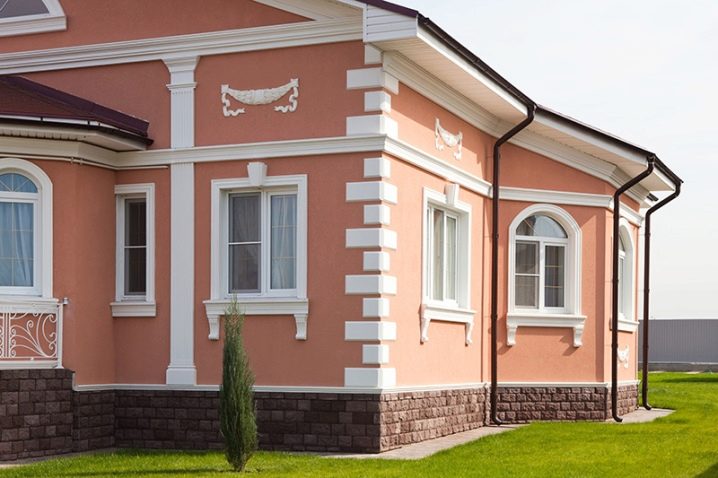
When decorating the facade, it is necessary to use stone, paint, plaster or any other suitable material.
Architectural lighting of the building is able to create a real miracle with the visual perception of this object in the evening and at night. Lighting elements paint the facade with new colors and shades, make it more "lively", adding dynamics to the design with light.
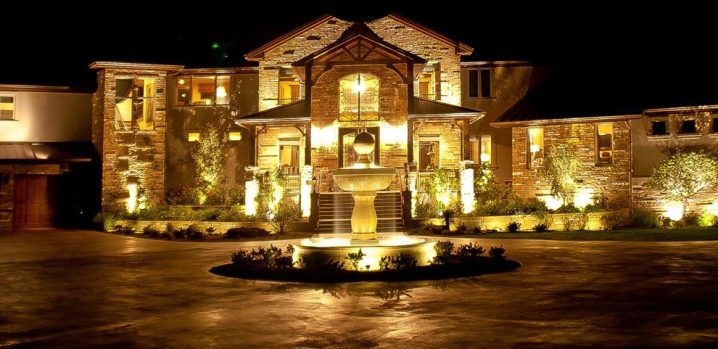
Window and door decoration
Elemental facades allow you to make a building unique in its kind and extremely impressive visually.
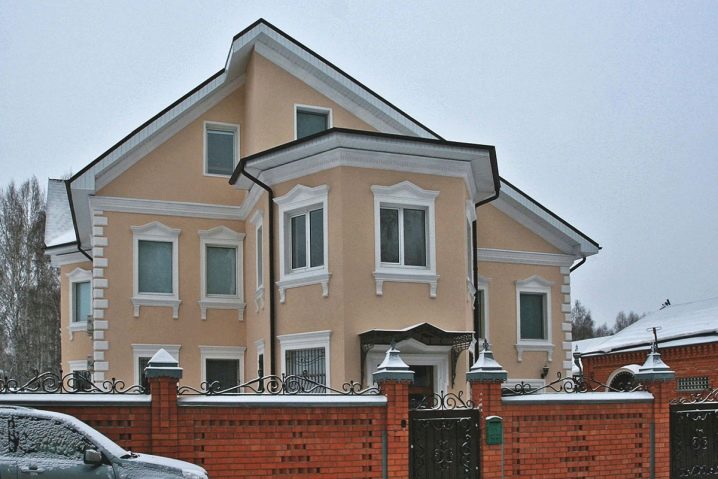
Sandrik
It is a decorative element that can be used to beautifully decorate the facade of a building. It is usually installed above a window or door. This element is a medium-sized protrusion above window or door openings, used exclusively for facade decoration.Most of these elements are successfully combined with other elements of the facade decor, for example, moldings, platbands, cornices and rustic panels. Applying sandrik, you can give the house a chic and status look.
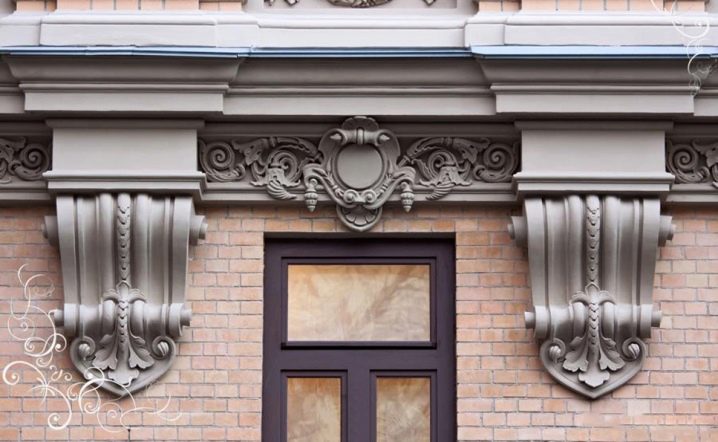
Molding
A versatile and popular element that is often used to decorate buildings with a finishing material made of clinker bricks or tiles. There are many different shapes and sizes of the element. It is quite lightweight and easy to install.
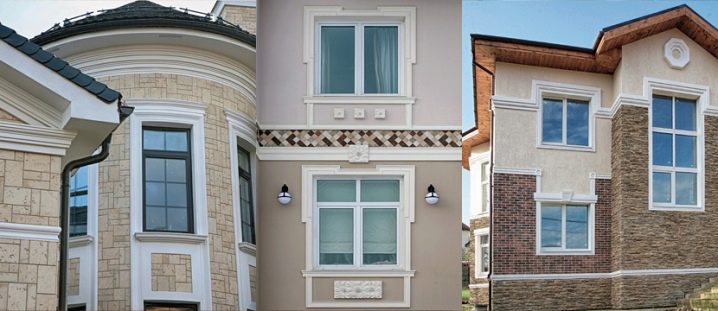
Cornice
This element is the protruding part of the decor, over which the roof begins. It is an extremely lightweight construction. There are many different shapes of the element. Usually the cornice is installed in the place where the horizontal slab of the cornice overhang and the front wall adjoin. It has no top roof and cannot be used over windows.
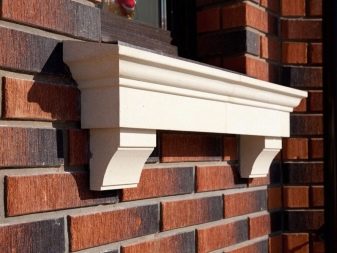
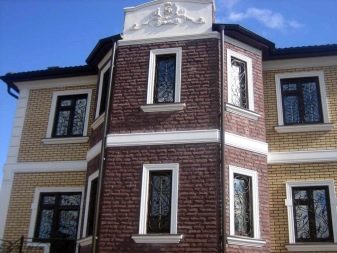
Arched decor
Quite often, you can find arched windows in architecture, and builders have a question how to arrange such window or doorways. In order to make the decoration neat and beautiful, it is necessary to use arched moldings, consisting of segments that are curved with a specific radius. To install these elements, the joints should be sharpened to fit them under the arched window opening.
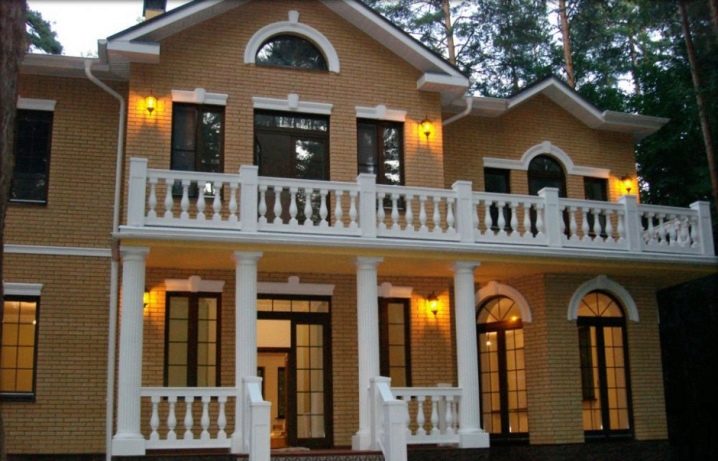
Radius moldings are used in the decoration of round towers or other similar elements. They are able to make the facade of a building more beautiful and unique.
Slope
It is a flat wide panel that helps to walk around the inside of window openings. Thus, it is possible to ensure the evenness of the surface and sufficient insulation of the side of the slope of the window and door.
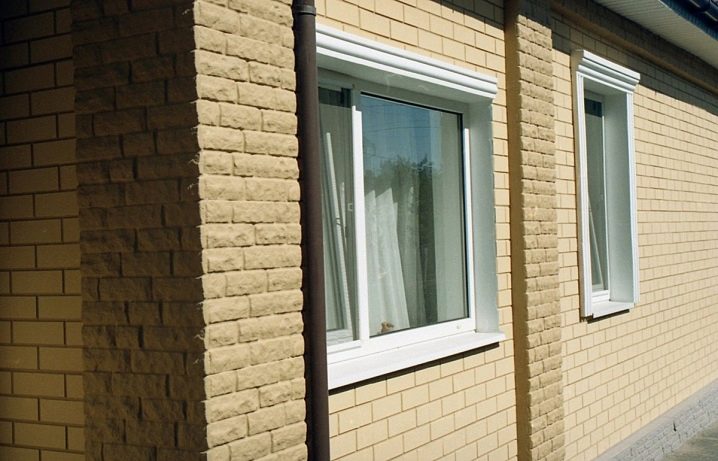
False shutters
Decorative elements that are hung on the facade only for aesthetic appeal.
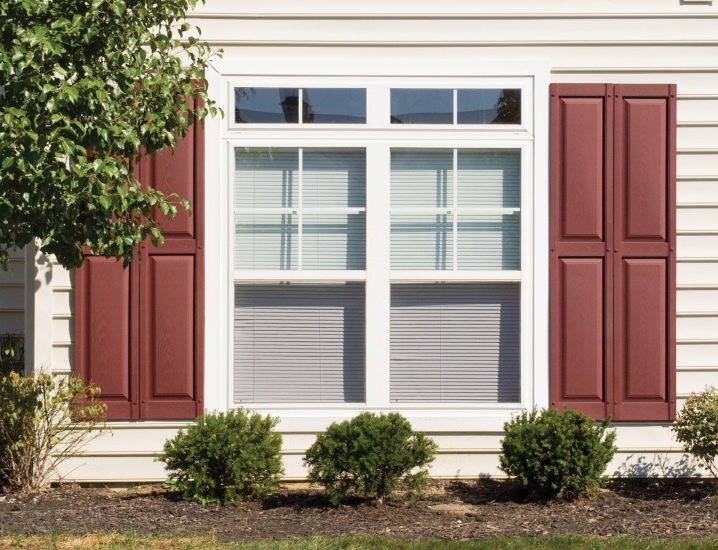
Bossages
Corner elements are rectangular and of medium thickness. They form the corners of the building, imitating large masonry. This can make the facade more massive.
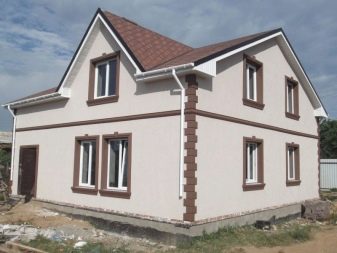
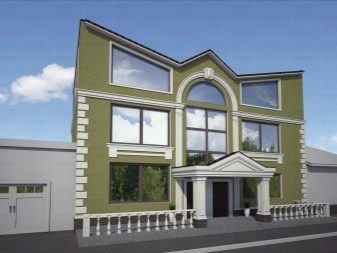
Advice
Before you start decorating the facade of the building, you should decide on the material from which the product will be made. You can find many different options, but there are many criteria to consider.
- To begin with, you should pay attention to the climatic conditions. Then - on the features of the house, on what material will be optimal for a particular style of design. And also it is worth remembering that if the owner of the house wants to do the installation of products on his own, it is better to choose elements made of the material that is easiest to install. This will help the person to make the facade of their house even better.
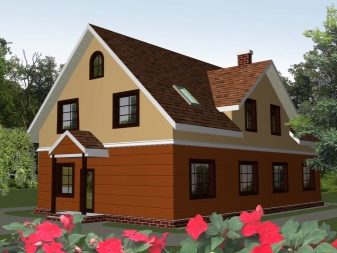
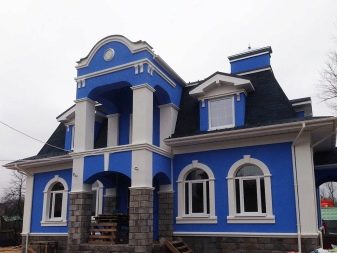
- Extremely easy installation with expanded polystyrene foam elements. Polyurethane products can be installed in the same way. This facade decor is so light and simple that anyone can handle it. It is important to remember that it is necessary to fix the foam parts only in the warm season (from +15 to +25 degrees).
- Prepare the surface first. If it is not prepared, the items may fall off. It is necessary to clean it from unnecessary objects (old paint, plaster, protruding parts). For this, sandpaper, a spatula or a sander can be used.
- It is also worth tapping the wall with a wooden or rubber mallet. If the surface of the wall is damaged, it must be repaired and allowed to dry.
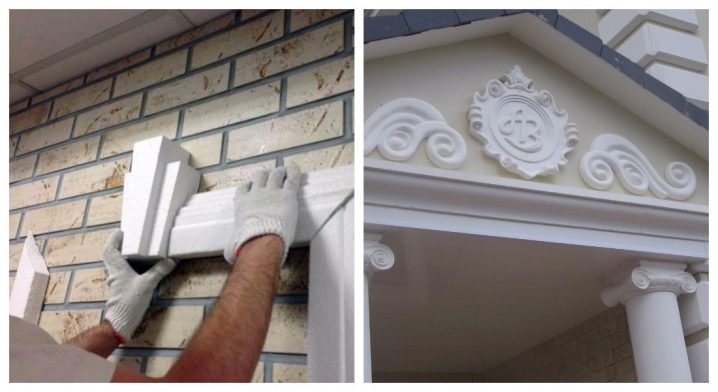
- You need to check the surfaces with a level. In the process of gluing the plates, irregularities of 10 mm per 1 square meter are allowed.
- If you need to stick on small parts, it is worth making the wall perfectly flat.
- Then you need to disassemble and fit the parts (lay them out on the floor, check the inscriptions).
- Sandriks and moldings are most often long, so you should cut them to size using a special knife or small hacksaw.
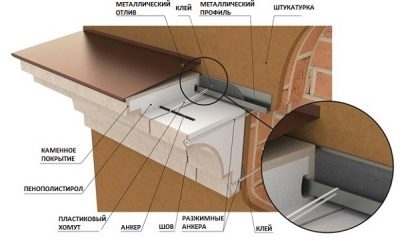
- It is necessary to fasten multi-spikes to the surface along the entire plane of the part. This is necessary to keep the product from shifting while the glue dries.
- Next, you need to try on the products on the wall, spread them with glue and attach. Press down so that the glue does not protrude from the edges.
- The joints are coated with acrylic sealant.
- After installation, you can paint the elements.
Beautiful examples
There are many beautiful and original examples of how facade decor can change the facade of a building. The house can become a real work of art. Decor elements can breathe new life into it.
- There is not a lot of decorative stucco molding here, but the contrasting selection of rustic materials and window frames with a light shade is still noticeable. This brings a slightly gloomy brick façade to life.
- Here you can enjoy the attractive classic-style façade. Columns, balustrades, rusts and cornices make the façade more expressive and interesting.
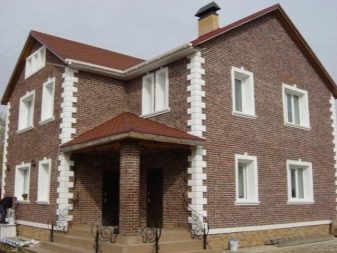
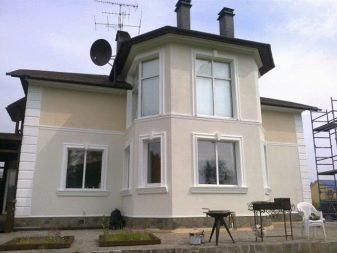
- Patterned stucco molding does not disturb the visual balance of other decorative elements, so the building looks attractive and neat.
- A medium-sized building, decorated with a facade decoration, becomes much larger visually and looks extremely noble and solid.
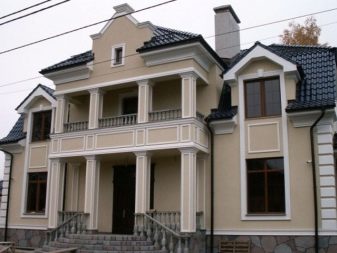
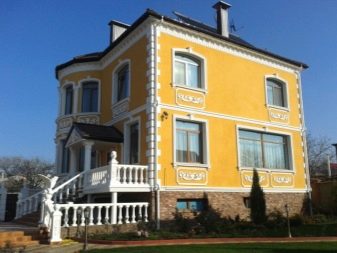
For information on how to make a facade decor with your own hands, see the next video.













The comment was sent successfully.